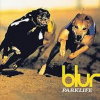Originally Published on L.S. Media. 30th July 2012.
Parklife was Blur’s third studio album and from the moment the listener heard the now classic beginning, they realised that not only was it a winner, a piece of recoding history given to the fans by the musical equivalent of Prometheus, but that it also set the band finally on the road to being a class act. What nobody foresaw, no-one at all, was how it would go on to define a decade and a generation aching the get away from the pop driven banality of the last couple of years and endless soap opera stars turned singers.
If Nirvana’s Nevermind was the moment that America’s youth turned their collective backs on the poodle-permed rock stars and over hyped celebrities and their lavish lifestyles, then Parklife was the British equivalent. Of course and by no means can the two bands be mentioned in the same breath when looked at genre defining rock driven music. Nirvana appealed to the seeming great unwashed youth rebellion that was struggling to find a voice and rebel about what was being fed to them in diet of saturated musical mush. Blur was…well they were fun but with a subtle nasty, surprising swift kick in the soft underbelly of force-fed pop and the alleged second-coming of American counter-culture and dismissive youth .
The message was clear; enjoy the music, dance to it, make love to it, should you wish but have an actual listen to Damon Albarn’s lyrics and you too might understand the loneliness of personal space and sense of unease that sneaks and winds through each track like herring gull in search of food, the scraps on the street.
Girls and Boys opens the album with the idea of 18-30 holidays in the Mediterranean, the street life mentality of sexuality and gender blurring. The iconic lines of mixed up relationships and sexual adventure hide the thought of promiscuity that had been hidden by government advertisement campaigns of the mid to late 80’s. Most of all, the music was synth-pop at its very best. It captured and framed a moment in time at its start. What followed with the so called Cool Britannia and Brit-pop culture can be neatly and squared at this moment. It was for the generation that was too young for the dying days of the first Progressive Rock movement and who were born on the cusp of the late 70’s and missing the anger of the time and the excessive exuberance of a disease ridden 80’s. This really was for them, those that followed generation X.
That said there were some nods to the past, even if subconsciously given. Tracey Jacks is another song off the album that on the face of it has the hall marks of a song that is just fun to listen to, to those that read the lyrics of the time; the framing of insanity, monotony and death like systematic crushing feel of getting older, to start feeling your life was unravelling, is all too real. The line, “I’d like to sit here and be normal but it’s just so overrated.” is a clarion call to the band’s peers and older fans that life is a muddle, priorities have been misplaced. It’s a stunning song and unfortunately, like other great tunes, not released as single. The roots of the song come from the great British tradition of the larger than life cartoon character, as with Genesis’ Harold the Barrel, the road to self destruction is often tainted with inability to cope with the modern age, a motif that was beginning to unnervingly and sadly shadow the band.
The real moment of inspired genius in the album, doesn’t exactly come a line or guitar hook; it’s the appearance of the actor Phil Daniels on the song Parklife and also in the tremendous and eye catching video that accompanied it. If Girls and Boys was the conception of Cool Britannia, then perhaps Parklife was its difficult and messy birth. Those that loved did so with vigour, those that hated the cheeky chappie, Small Faces sound, derided it for all that it was worth.
What is not in question is how uplifting the lyrics could be and the hope that a lot of music lovers saw in it. By having Phil Daniels, the man who made being a mod cool in Quadrophenia, talk over the music was not just inspired; it was a dream, a match made in heaven. If anything it bought two generations together for a while. The 13-20 year old got the message behind the song but also they were able to look at their parents in new lights. Those that had talked of mods and rockers before suddenly got a wider perspective on the world. Sometimes even older guys can be cool and know a thing or two.
The album isn’t without its difficulties, some of the songs sound rushed and given the time scale they recorded every song in, that’s not really surprising. The Debt Collector feels drained, Magic America a painful and bitter experience at trying to give Pink Floyd’s Syd Barrett a bad name, even in homage it doesn’t work. These though are few and far between and should be overlooked, forgotten and consigned to a trash bin on your player of choice. For when Parklife gets it right, it’s stunning and a collection of songs, mostly, that just trip off the tongue and cheer the mind, if not exactly sitting comfortably with the soul.
Parklife is easily the best album from the very beginning of the band, Blur’s marker for what followed. From their first album to this, their third, it stands out as creatively as almost any other from the early 90’s and a real gem to get as part of the back catalogue re-releases.
Ian D. Hall

